Futures Jump As Blowout TSMC Earnings Reboot Tech Trade
US equity futures are higher led by Tech stocks which bounced back on Thursday after chipmaker TSMC revived confidence in the durability of artificial-intelligence demand, as signalling a strong outlook with $56BN in CapEx spending in 2026 (a 25% increase), restoring confidence in global AI growth and sending Europe's ASML to a record high. Silver dropped for the first time in 5 days from a record high as the US held off from attacking Iran and refrained from imposing import tariffs on critical minerals. As os 8:00am ET, S&P 500 futures were 0.4% higher with Nasdaq 100 contracts +0.7%. Pre-market, Mag 7 are all higher led by NVDA (+1.4%), AMZN (+0.7%), TSLA (+0.5%) and MSFT (+0.5%).Goldman Sachs and Morgan Stanley are also higher after reporting solid Q4 earnings. Bond yields are unchanged; The US dollar is 7bps higher. Commodities are mostly lower: oil fell 4.4%; silver is down 2.0%; metals are mostly lower today. Situation in Iran is closely watched, as an Iran official pledged not to execute protesters. Trump said he has no plan to fire Powell in a RTRS article. Today's US economic calendar includes January Empire manufacturing and Philadelphia Fed business outlook, November import/export prices, and weekly jobless claims (8:30am) and November TIC flows (4pm).

In premarket trading, Nvidia leads Mag 7 stocks after TSMC’s stellar outlook. All Mag 7 stocks are higher (Nvidia +1%, Amazon +0.7%, Tesla +0.4%, Alphabet +0.5%, Microsoft +0.4%, Meta Platforms +0.3%, Apple is little changed)
- Applied Materials (AMAT) rises 7% as Barclays upgrades to overweight. The chip-tool maker is also getting a boost after TSMC set a bullish capital spending target, signaling strong demand for AI chips.
- Chip equipment stocks lead gains in the semiconductor sector after TSMC set its 2026 capital spending target above investor expectations, signaling confidence in the AI boom.
- Bitmine Immersion Technologies (BMNR) rises 1.1% after investing $200 million in Beast Industries, a content creation company founded by YouTube creator MrBeast.
- BlackRock (BLK) gains 1.9% after the asset manager reported adjusted EPS and net inflows that came in above the average analyst estimates.
- Calavo Growers (CVGW) rises 14% after Mission Produce agreed to buy the avocado producer for $27 per share in cash and stock, at enterprise value of about $430 million. Mission Produce (AVO) -6%.
- Morgan Stanley (MS) rises 1.3% after posting quarterly results.
- Penumbra (PEN) rises 11% as Boston Scientific agreed to buy the company in a cash and stock deal that values Penumbra at $374/share.
- Talen Energy Corp. (TLN) gains 10% after signed agreements to acquire three natural gas power plants from Energy Capital Partners for $3.45 billion.
In corporate news, Amazon is challenging Saks’ bid to fund its bankruptcy with financing that would provide the retailer with fresh cash, saying it would harm Amazon and other unsecured creditors. Paramount Skydance named a new CFO as it continues to fight for control of Warner Bros. Elon Musk’s xAI is disabling the ability for people to use Grok to create sexualized images of real people, following widespread criticism.
After a week filled with geopolitical tensions and Trump wild cards, the AI story is back and boosting stocks. TSMC’s big beat and huge capex forecast, is fueling optimism that the AI boom has plenty of room to run. The AI-bellwether said it would lift capital spending by at least a quarter to as much as $56 billion in 2026 and forecast faster-than-expected revenue growth. Here is a summary of the blowout results and guidance that TSMC just reported:
- Net Profit 505.7bln (exp. 467bln),
- Revenue 1.046tln (exp. 868.46bln),
- CapEx USD 40.9bln (exp. USD 40-42bln).
- Q4 gross margin 62.3% (exp. 60.6%), +3.3ppts Y/Y.
- Q4 revenue from high performance computing +4% Q/Q.
- Q4 revenue from smartphones +11% Q/Q.
- Q4 revenue from IoT +14% Q/Q.
- Guides Q1 Revenue between USD 34.6-35.8bln (exp. 33.2bln),
- Guides Gross Margin between 63-65% (exp. 59.6%),
- Sees Operating Margin between 54-56% (exp. 50%),
- 2026 CapEx to come in between 52-56bln (prev. 40.9bln in 2025)
- Capex is to be higher in the next three years. Cost of tools are becoming more expensive. Long term gross margins of 56% and higher is achievable. In 2026 there are uncertainties from tariffs.
- Will be prudent in business planning. Robust AI-related demand. Increasing AI model adoption. 2026 sales to grow by close to 30% in USD terms. Preparing to increase capacity to support customers.
- Customers are providing strong signals and reaching out directly to request capacity. Firms have been showing TSMC that AI is a significant help to their businesses. Announces plans to expand its fabrication facilities in Arizona. Co. is worried about electricity in Taiwan. Co. informed that Silicon from TSMC is a bottleneck with the Co. aiming to deal with the bottle neck first and foremost. Reduced their 6 and 8 inch wafer capacity to optimise resources.
Chip-equipment makers led gains within the sector. ASML Holding NV, which counts TSMC as its biggest customer, jumped more than 5% in Amsterdam. TSMC suppliers Applied Materials Inc. and Lam Research Corp. rose more than 7% in premarket trading. AI heavyweights such as Nvidia Corp. and Alphabet Inc. also advanced, though the gains were more muted.
TSMC’s “approach to guidance suggests further upside to consensus estimates and supports a constructive outlook,” said Gary Tan, a portfolio manager at Allspring Global Investments.
The renewed optimism around AI follows weeks of steady rotation away from mega-cap technology stocks and toward a broader set of companies leveraged to improving growth prospects. The trend saw the S&P 500 post its first back-to-back losses on Wednesday even though a majority of its members advanced. The rotation trade sweeping through equities is highlighted in a Goldman Sachs survey. “Technology remains the top pick, though its lead has narrowed compared to last year — mirroring the decline in enthusiasm for the US market,” strategist Guillaume Jaisson wrote.
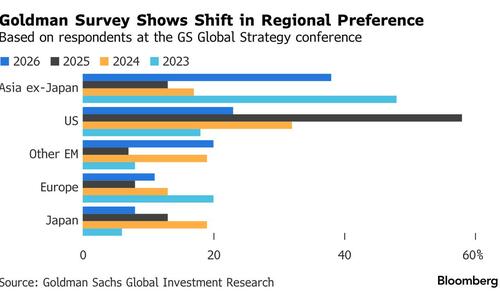
Elsewhere, in tech news, OpenAI signed a $10 billion deal with Cerebras for computing power, with ambitions to make ChatGPT the fastest platform in the world. Alibaba showcased plans to link flagship services and build Qwen into a one-stop AI platform. Today’s Tech Watch looks at how soaring prices for memory and storage are causing headaches for customers.
In other assets, oil was down for the first time in six days as Trump indicated he’s holding off on any attack on Iran for now, a statement that also put the rally in gold on pause. Silver dropped after the US refrained from imposing tariffs on critical minerals. But it did levy a 25% tariff on imports of certain advanced semiconductors, a key step in allowing Nvidia to ship Taiwan-made H200 AI processors to China.
In geopolitics, China banned cybersecurity products from American and Israeli firms, including Palo Alto Networks and Fortinet. Trump told Reuters he sees Ukraine’s leader Volodymyr Zelenskiy as the main obstacle to an agreement to end the war Russia launched four years ago. And Germany will take the lead of European nations sending military personnel to Greenland. Trump also told Reuters that he doesn’t plan to fire Powell despite the DoJ probe.
European stocks are mostly positive with a TSMC-led surge in ASML shares lifting the Euro Sstoxx 50 higher by 0.5%. CAC 40 lags with the luxury sector weighed down by Richemont’s margin concerns. Here are some of the biggest movers on Thursday:
- VAT Group hares gain as much as 18%, the most since April, as preliminary net sales for the full year show an earlier upswing than analysts had previously expected.
- ASML shares soar as much as 7.7% to a record high, after its key customer Taiwan Semiconductor Manufacturing Co. gave a stronger-than-anticipated outlook for 2026.
- Schroders shares gain as much as 8.9%, hitting their highest level since August 2023, after the asset management group said annual adjusted operating profit will come in ahead of expectations.
- Swedbank shares jump as much as 6.7% to a record high after the US Department of Justice closed a yearslong investigation without imposing penalties.
- Ashmore Group shares rally as much as 17% after the emerging markets-focused asset manager reported the first monthly net inflows since 2021.
- Richemont shares reverse earlier gains to slide as much as 3.4%, as worries over margins at the Swiss owner of Cartier and Van Cleef overshadow a robust sales report.
- Repsol shares drop as much as 7%, the most since April, after the Spanish oil company released a trading statement that analysts view as mixed, with a miss on upstream production.
- OMV shares drop as much as 2.9% after the Austrian oil and gas company reported fourth-quarter production that missed estimates.
- Dunelm shares slide as much as 18%, the most since March 2020, after the homeware retailer reported softer-than-expected results and downgraded first-half pretax profit guidance.
- Taylor Wimpey shares fall as much as 5.2%, the most in three months, as the UK homebuilder guides that margins will be lower in 2026 than in 2025.
Asian stocks were slightly lower, with declines in some of last year’s big AI winners pulling down the regional benchmark. The MSCI Asia Pacific Index fell 0.2% as markets consolidated after three straight sessions of gains. Japan’s Advantest and Tokyo Electron lost more than 3% each. Trip.com’s shares were another big drag, plunging more than 20% in Hong Kong after Chinese regulators said the online travel agency was being investigated over alleged antitrust conduct. Despite Thursday’s weakness, the MSCI Asia gauge is firmly on course for a fourth striaght week of gains, which would mark the longest streak since May 2025. Meanwhile, Chinese stocks on the mainland fell for a third straight day amid efforts by regulators to rein in potential froth in the market. Beijing on Wednesday tightened rules on margin financing, signaling unease over the pace of a rally that has added $1.2 trillion in value over the past month alone. Here Are the Most Notable Asian Movers
- Alibaba’s shares drop as much as 3.5% in Hong Kong, as investors book gains following a much-anticipated product event Thursday on its AI offerings.
- Treasury Wine Estates Ltd. shares fell the most in a month after reports that an American distributor may sell its operations raised the prospect of further disruption to the company’s already struggling US business.
- Merdeka Battery Materials and Trimegah Bangun Persada lead a rise in Indonesian nickel miner stocks as the governnment is likely to issue quotas for between 250 million and 260 million tons of nickel ore this year, implying lower production for the year.
- Shift Inc. shares plunge as much as 10% to the lowest since Sept. 2024 after the Japanese IT services company announced its first quarter earnings with possible profit declines ahead.
- Toho shares climb as much as 7.3%, the most since July 16, after the Japanese film and TV company announced its third quarter earnings and appeared bullish about its upcoming movie releases.
- Toyota Industries Corp. shares rise as much as 6.8% to ¥19,255, higher than the revised tender offer price of ¥18,800 from the Toyota group
In FX, the yen was able to claw back losses versus the dollar after a report that the BOJ is increasingly focused on the weak currency. Bloomberg Dollar Index is flat. The pound is down despite a beat for monthly UK GDP.
In rates, treasuries hold small losses amid similar price action in European government bonds as US stock futures climb. Front-end tenors lead gilts selloff after UK GDP beat estimates, curbing wagers on BOE rate cuts. US session includes weekly jobless claims data and five scheduled Fed speakers. US yields are 2bp-3bp cheaper with belly leading losses, flattening 5s30s spread by 1.2bp; 10-year at 4.15% is near session high, 2bp cheaper on the day, with UK front-end yields higher by 4bps. IG dollar new-issue slate includes five names so far; seven borrowers priced a combined $12.65 billion Wednesday, led by JPMorgan with a three-part, $6 billion offering. Issuers paid negative concessions on deals that were 5.6 times oversubscribed. US, German and UK 10-year yields are higher by 1-2 basis points. UK curve has bear-flattened post-GDP.
In commodities, spot gold and silver are lower but off worst levels following a slide during APAC hours. Crude futures fall after US President Donald Trump signaled he may refrain from attacking Iran for now. Bitcoin is down 0.8%.
Today's US economic calendar includes January Empire manufacturing and Philadelphia Fed business outlook, November import/export prices, and weekly jobless claims (8:30am) and November TIC flows (4pm). Scheduled Fed speakers include Goolsbee (8:30am), Bostic (8:35am), Barr (9:15am), Barkin (12:40pm) and Schmid (1:30pm).
Market Snapshot
- S&P 500 mini +0.4%,
- Nasdaq 100 mini +0.7%
- Russell 2000 mini +0.2%
- Stoxx Europe 600 +0.3%
- DAX little changed, CAC 40 -0.3%
- 10-year Treasury yield +1 basis point at 4.14%
- VIX -0.5 points at 16.22
- Bloomberg Dollar Index little changed at 1210.7
- euro little changed at $1.1638
- WTI crude -4.5% at $59.24/barrel
Top Overnight News
- Oil fell for the first time in six days after Donald Trump signaled he may hold off on attacking Iran for now after being reassured that Tehran would stop killing people involved in protests. BBG
- U.S. President Donald Trump said on Wednesday he has no plans to fire Jerome Powell despite a Justice Department criminal investigation into the Federal Reserve chair, but it was "too early" to say what he would ultimately do. RTRS
- Volodymyr Zelenskiy is the main obstacle to an agreement to end Ukraine’s war with Russia, Trump claimed, telling Reuters that Vladimir Putin is “ready to make a deal.” BBG
- Nasdaq futures swung to a gain (NDX futs +85 bps pre mkt) after TSMC renewed confidence in AI demand, earmarking as much as $56 billion in capital spending for 2026. ASML’s shares rallied to a record on its client’s upbeat outlook. BBG
- The US is intensifying pressure on Mexico to allow US military forces to conduct joint operations to dismantle fentanyl labs inside the country. NYT
- Coinbase Global Inc. has pulled its support for the current version of the market-structure bill due for markup in the Senate Banking Committee on Thursday. Coinbase's CEO Brian Armstrong cited "too many issues" with the bill, including a defacto ban on tokenized equities and DeFi prohibitions. BBG
- China’s central bank rolled out targeted easing measures to bolster support for sectors deemed strategic by Beijing, as policymakers seek to ensure a strong start to the year. The PBOC will cut rates on its structural policy tools by 0.25 percentage point, lowering the rate on one-year relending facilities to 1.25%. WSJ
- Leaders of Japan's main opposition Constitutional Democratic Party of Japan and the lay Buddhist organization-backed Komeito agreed on Thursday to establish a new party bringing together "centrist forces" to fight a snap parliamentary election in February. Nikkei
- Hedge funds are betting the yen may slide to 165 a dollar before authorities intervene, with traders using options to position for a weakening currency. BBG
- BofA card spending, week to January 10th: +4.6% Y/Y (prev. 1.7%). Strong growth across most categories, partially due to favorable base effects.
Trade/Tariffs
- Japanese Finance Minister aims to make progress in selecting projects as part of Japan and US bound investment package if PM Takaichi meets with US President Trump. Fiscal reform is impossible with economic growth. said next years financial budgets reliance on debt is at a sustainable pace.
- Canada and China sign a trade cooperation MOU. Both sides committed to resolving outstanding agricultural trade issues by maintaining open channels of communication.
- Indian Trade Secretary on the India-EU trade deal negotiation said some agricultural items remain off the table.
- Indian Trade Secretary said a deal with the EU is very close but there's still room for further negotiations to solve various issues.
- China's Foreign Minister said they are ready to strengthen cooperation and trust with Canada.
- China is said to be drafting purchase rules for NVIDIA's (NVDA) H200 chips, Nikkei reported, as an attempt to balance its desire to foster domestic chip development with Chinese tech firms.
- Taiwan’s government said Taiwan and the US have previously held multiple discussions and reached consensus on preferential tariff treatment for semiconductors and related products under Section 232. Taiwan’s government said Taiwan will subsequently schedule a separate meeting with the Office of the U.S. Trade Representative to sign the Taiwan–US trade agreement documents.
- The White House said President Trump imposed a 25% tariff on certain advanced computing chips, such as NVIDIA (NVDA) H200 and AMD (AMD) MI325X chips. Depending on the outcome of negotiations, President Trump may consider alternative remedies in the future, including minimum import prices for specific types of critical minerals. The Secretary and the trade representative should consider price floors for trade in critical minerals and other trade-restricting measures. The US chip tariff will not apply to chips imported for US technology supply.
- The White House said that in the near future, US President Trump may impose broader tariffs on semiconductor imports and their derivative products.
- US President Trump ordered the Commerce Dept. and USTR to negotiate agreements with foreign suppliers to reduce US reliance on imported processed critical minerals, citing national security risks. Negotiators have 180 days to secure binding or enforceable agreements.
A more detailed look at global markets courtesy of Newsquawk
APAC stocks traded mostly in the green, outperforming their US counterparts, though the Nikkei lagged the region. ASX 200 continued its trend higher as mining and materials names advanced, supported by fresh ATHs in metals and news that Rio Tinto and BHP are collaborating on iron ore extraction in the Pilbara. Nikkei 225 underperformed, slipping back below 54,000 as reports that opposition parties CDP and Komeito have begun talks to form a new party weighed on sentiment. KOSPI traded comfortably in the green, extending to new ATHs and nearing 4,750, whilst the BoK kept rates steady as expected in a unanimous decision. Hang Seng and Shanghai Comp saw mixed trade, with the Hang Seng hovering just below ATHs near 27,380 while the Shanghai Composite oscillated around the unchanged mark as Chinese markets struggled for traction.
Top Asian News
- Earthquake of magnitude 5.5 in the Hokkaido region in Japan, EMSC reported.
European equities (STOXX 600 +0.4%) opened mixed to higher. AEX (+1%) outperforms, lifted by strong gains in ASML (+5.5%) following robust TSMC earnings & guidance, which showed a 35% jump in Q4 profit. European sectors are mixed. Tech (+1.7%) leads, driven by strength in ASML (+5.5%), while Financial Services (+1.2%) are boosted by post-earning strength in Partners (+6.2%). Consumer Products initially boosted by gains in Richemont (-2.2%), but the Co. has since slipped into negative territory. Q3 earnings were strong, but Richemont did highlight that rising material costs continuing to weigh on margins.
Top European News
- BoE Credit Conditions Survey: Demand for secured lending for remortgaging was unchanged in Q4, and was expected to increase in Q1. Within the overall figure, demand for credit card lending increased in Q4, and was expected to be unchanged in Q1. Demand for corporate lending in Q1 was expected to be unchanged for small, medium-sized, and large businesses.
- ECB's de Guindos said "it is very important for all of us that the principle of central bank independence is also applied to the Federal Reserve.".
Central Banks
- US President Trump said no plans to remove Fed Chair Powell.
- US President Trump rejects criticism from Senate Republicans of the Justice Department probe of Fed chair Jerome Powell and said “they should be loyal.”; speaks highly of Kevin Hassett and Kevin Warsh.
- BoJ is reportedly likely to keep rates steady in January; some officials are said to be concerned over the economic impact of a weak JPY, Bloomberg reported. If the JPY continues to weaken, then the pace of future rate hikes could be accelerated. But, policy will remain on hold in January. Possible that the negative aspects such as a further JPY depreciation and the impact on personal consumption, will become a point of concern.
- BoJ Governor Ueda said mechanism under which wages and prices rise moderately in tandem likely to be sustained. BoJ is expected to keep raising interest rates if targets are met.
- ECB's Kazaks said policy rates are optimally positioned as inflation trends improve. Warns that inflation and growth risks are balanced and emphasises the need for vigilance.
- PBoC cuts the one-year relending facility rate to 1.25% (prev. 1.50%), to increase tech innovation quotas by CNY 400bln to CNY 1.2tln. Central Bank to boost relending quotas to power tech innovation. Pledges continued liquidity support via open market tools. Overnight rates will be guided to hover near policy rates. Will maintain ample liquidity to support bond issuance. Will flexibly conduct government bond operation going forward. Lowers minimum down payment for commercial property loans to 30% to boost market inventory clearance. No intention to use currency depreciation for trade advantage. Will guide expectation and prevent overshooting in CNY risk.
- China's PBoC Deputy Governor announces plans to release a series of monetary and financial measures.
- Bank of Korea keeps Base Rate unchanged at 2.50%, as expected. Removes "potential rate cut" reference from the statement.
- BoK Governor Rhee said the Government is to make an announcement on the US trade deal and the FX market later in the day.
- BoK Governor Rhee said rate decision was unanimous, need to remain cautious on FX volatility. 5 members see a 'high chance' of a hold in the next 3 months, 1 sees a cut in the near-term. Addressing FX volatility requires immediate steps as well as structural reforms. A weak KRW is not likely to trigger any financial crisis and have ample amounts of USDs.
FX
- DXY is flat and trades within a very thin 99.08-23 range; currently just above its 50 DMA at 99.02. Focus overnight has been on geopols, whereby President Trump said Iran has “no plan” to execute protestors. Back in the US, Trump said he has no plans to remove Fed Chair Powell, whilst also speaking highly of the prospective new Fed Chairs Hassett and Warsh.
- GBP currently trades flat, within a 1.3423-1.3446 range; the peak for today is a handful of pips short of its 21 DMA at 1.3452. Some strength was seen in Cable following the region’s GDP series, which topped expectations and has Q4 GDP on track to surpass the BoE's forecast of no growth. Pantheon Macroeconomics said it expects UK growth to improve to 0.4% Q/Q in Q1 as Budget uncertainty fades, seasonality lifts the New Year, and September’s cyber-attack volatility limits spare capacity, keeping the MPC cautious.
- JPY is flat this morning, but subject to volatility, after Bloomberg reported that the BoJ is likely to keep rates steady in January; some officials are said to be concerned over the economic impact of a weak JPY. The piece added that if the JPY continues to weaken, then the pace of future rate hikes could be accelerated. But, policy will remain on hold in January. This spurred immediate pressure in USD/JPY, falling from 158.68 to 158.33.
- China's FX regulator will formulate a basket of policy measures to promote cross-border financing.
Fixed Income
- A contained start for fixed benchmarks. Haven allure that was helping on Wednesday has been removed by the updates around Iran (see Commodities for details).
- That aside, newsflow has been a little light and largely focused on nation-specifics rather than broader macro drivers; though, TSMC earnings are the exception, again, see the feed for details.
- USTs have spent the morning in a narrow 112-11 to 112-17+ band, Bunds in equally slim 128.23 to 128.46 confines with both benchmarks flat overall. However, a modest bullish bias is beginning to emerge, more so for EGBs than USTs, potentially as the morning's supply from Spain has now passed and was well received, digestion of the Ukraine-Russia-US situation and/or the pulling back of crude benchmarks weighing on yields. Though, the latter narrative is clouded by the gains in European gas.
- Gilts opened marginally softer and then slipped a few ticks further to a 92.67 base despite the firmer lead from EGBs. UK debt weighed on by strong GDP data for November, a series that has the Q4 trend tracking above the BoE's estimate of no growth for the period. However, this pressure proved shortlived with Gilts grinding higher and the marginal outperformer, posting upside of just over 10 ticks.
- Spain sold EUR 5.86bln vs exp. EUR 5-6bln 2.35% 2029 Bono & 3.50% 2041, 1.45% 2071 Bonds.
Commodities
- Crude benchmarks are on the back foot and remain near lows of USD 58.99/bbl and USD 63.46/bbl for WTI and Brent after some of the pressure was let out of the US-Iran situation. A move driven in late US hours by President Trump saying he had been told that the killing within Iran was stopping. However, we then saw some reports of explosions in Tehran, an update that sparked a short-lived spike of c. USD 0.50/bbl, before paring amid some uncertainty around the validity of that report.
- As discussed earlier in the week, gas benchmarks remain bid with gains of nearly a EUR/Mwh at a EUR 33/MWh peak for Dutch TTF. Drivers for the space include any potential impact to Iranian flows to Turkey, the above Ukraine situation escalating and the continued cold spell in Europe.
- Precious metals are broadly in the red this morning, following on from the subdued action seen overnight. Negative action this morning due to some unwinding of recent geopolitical risk premia after US President Trump said that he had been told the killing in Iran is stopping and that there is no plan for executions. As a reminder, the President had repeatedly threatened action against the Iranian regime, if they killed protestors. As it stands spot gold trades at the lower end of a USD 4,580.98-4,632.45/oz range.
- Base metals are also following precious peers lower; 3M LME Copper trades just above the USD 13k/t mark, in a USD 12,914-13,216.35/t range – downside which also follows the negative sentiment seen across the Chinese equities space.
- US Ambassador announces plan to work with Belgium on a USD 50bln LNG deal.
- The US is said to be considering private contractors to safeguard oil in Venezuela, CNN reported citing sources.
- US President Trump said it would be better for Venezuela to remain in OPEC but is unsure if this would be beneficial to the US.
Geopolitics: Ukraine
- US President Trump said Ukrainian President Zelensky is to blame for the current stalemate in Russia–Ukraine negotiations, adding that Russian President Putin is “ready to make a deal.”.
Geopolitics: Middle East
- "Flight restrictions in Iran lift, without explanation," AP reported.
- UN Security Council plans to meet with Iran at 15:00 EST / 20:00 GMT on Thursday, AFP reported.
- Iran has extended its airspace closure NOTAM until 03:30 UTC (~2 hours from now).
- US President Trump said Iran's government could fall due to unrest but "any regime can fail".
- US President Trump has told his National Security team that any US military action in Iran to be swift and decisive, NBC News reported citing sources; adds that a sustained war is undesirable. Trump's advisors have so far not been able to guarantee a quick collapse of Iran's regime.
- NOTAM over Iran has expired, according to reported.
- Iran's Foreign Minister Araghchi said there have been many threats by US President Trump and others but we are in control, hopes tensions do not reach a high level; no plans to carry out executions against protestors. Not ready to give up our legitimate right to the peaceful use of nuclear technology.
- Iran issues NOTAM to close all airspace, according to reported; "NOTAM is valid for a little more than 2 hours"; closes airspace to all flights except international flights to Iran with prior permission.
- “All the signals are that a US attack [against Iran] is imminent, but that is also how this administration behaves to keep everyone on their toes. Unpredictability is part of the strategy,” Reuters reported, citing a Western military official.
- The X account which flagged the initial explosions in Tehran said they have deleted the post "as the source appears to be a bit flimsy, though reporting on any potential action is going to be difficult due to the ongoing internet blackout across Iran".
- US President Trump has made it clear to the National Security team his goals for any US military action in Iran, NBC news reported.
- Maersk (MAERSKB DC) MECL service returns to trans-Suez route; following improved stability in the Red Sea, enabling more efficient transit times while maintaining safety as the top priority.
Geopolitics: Other
- Colombia President Petro is to meet with US President Trump on February 3rd.
- US President Trump posted "had a very good call with the Interim President of Venezuela, Delcy Rodríguez. We are making tremendous progress, as we help Venezuela stabilize and recover.". "Many topics were discussed, including Oil, Minerals, Trade and, of course, National Security.".
- The US Senate votes 51-50 in favour to allow US President Trump to act on Venezuela military action without Congressional approval; VP Vance casting the deciding vote.
- Chinese officials have reached out to counterparts in Venezuela and the US to seek assurances regarding their loans to Venezuela, Bloomberg reported citing people familiar with the matter.
US Event Calendar
- 8:30 am: United States Jan Empire Manufacturing, est. 1, prior -3.9
- 8:30 am: United States Jan Philadelphia Fed Business Outlook, est. -1.35, prior -10.2, revised -8.8
- 8:30 am: United States Jan 10 Initial Jobless Claims, est. 215k, prior 208k
- 8:30 am: United States Jan 3 Continuing Claims, est. 1897k, prior 1914k
- 8:30 am: United States Fed’s Goolsbee Speaks on CNBC
- 8:35 am: United States Fed’s Bostic Delivers Remarks at Metro Atlanta Chamber
- 9:15 am: United States Fed’s Barr in Penal Discussion on Stablecoins
- 12:40 pm: United States Fed’s Tom Barkin Speaks on Virginia Economic Outlook
- 4:00 pm: United States Nov Total Net TIC Flows, prior -37.3b
DB's Jim Reid concludes the overnight wrap
Markets faced a growing array of geopolitical risks yesterday, with oil prices seeing large swings as investors focused on the latest developments in Iran. At one point, Brent crude even reached its highest intraday level since September as speculation about a US intervention gathered pace, at $66.82/bbl, but this morning it’s fallen back to $64.24/bbl after Trump suggested he’d hold off an attack for now. That also led to huge swings in precious metals, with yesterday seeing new records for gold (+0.87% to $4,627/oz) and silver (+7.14% to $93.16/oz), before they also came down this morning after Trump held off on imposing tariffs on critical minerals. Otherwise, the main equity story was a slide for tech stocks, with the Mag 7 (-1.56%) pushing down the S&P 500 (-0.53%). But despite all that, there was still a lot of resilience among equities more broadly, as most of the S&P’s constituents still advanced, pushing the equal-weighted index (+0.40%) to a record high, alongside a new record for Europe’s STOXX 600 (+0.18%). So, for now at least, most equities have been unfazed by the geopolitical developments.
In terms of those various market drivers, Iran was the main story yesterday as oil prices reacted to different headlines. The initial surge was caused by a Reuters report, which said that some personnel had been advised to leave the US military’s Al Udeid Air Base in Qatar. That was significant because the base previously saw an Iranian missile attack last June, so the story added to fears that some sort of escalation might take place imminently. However, Trump later downplayed the magnitude of tensions, saying “we’ve been told that the killing in Iran is stopping — it’s stopped… And there’s no plan for executions”. So that was taken as a signal that the US might hold off on a potential military response, with Brent falling by $3 in just over half an hour before partially recovering. There’s clearly lingering caution, not least given the unexpected timing of US strikes on Iran in June 2025, and at $64.24 this morning Brent crude is still clearly above its lows below $60/bbl last week, but Trump’s comments had a clear impact. Bear in mind as well that Iran is a more significant oil producer than Venezuela, producing 4% of the world’s total in 2023, so developments there have the potential for wider spillovers in the oil market.
In the meantime, there were fresh headlines on Greenland, as Trump posted that “The United States needs Greenland for the purpose of National Security.” That came ahead of a meeting between Vice President JD Vance and Secretary of State Marco Rubio with the foreign ministers of Denmark and Greenland. After the meeting, the sides agreed to set up working groups to see if a way forward could be found, but Denmark’s foreign minister said that they “still have a fundamental disagreement” with the US, adding that demands that would violate Denmark and Greenland’s sovereignty were “totally unacceptable”.
Whilst the geopolitical developments had a big impact in commodity markets, there wasn’t much direct effect on bond and equity markets. Admittedly, the S&P 500 was down -0.53% yesterday, but that was because of a slump for tech stocks, with the Magnificent 7 down -1.56%, in contrast to most of the S&P’s constituents which rose yesterday, with 318 moving higher. So we saw more of the rotation pattern at play since the start of the year, with the small-cap Russell 2000 (+0.70%) hitting a new record as it outperformed the S&P 500 for the ninth session in a row. Indeed, the Russell 2000 is now up +6.84% YTD, in contrast to a -1.49% decline for the Mag-7. Otherwise, there was ongoing weakness among US banks, with the KBW Bank index (-0.70%) down for a 4th consecutive session, which came as Wells Fargo (-4.31%), Citigroup (-3.89%) and Bank of America (-2.06%) all fell back after their latest earnings reports.
In the meantime, it was a very strong session for US Treasuries, with the 2yr yield (-2.3bps) falling to 3.51%, whilst the 10yr yield (-4.7bps) posted its biggest decline in almost two months, down to 4.13%. That came as investors priced in more rate cuts ahead, with futures now pricing in 54bps of cuts by the December meeting, up +1.8bps on the day. Interestingly, that was despite some hawkish comments from Fed officials, with Minneapolis Fed Kashkari expressing concern on inflation in an NYT interview, saying that it was “entirely plausible that we are sitting here well above our target for two to three more years”, and “Then we’re looking at seven or eight years of elevated inflation. That’s very concerning to me.” On similar lines, Atlanta Fed President Bostic also said that “The inflation challenge has not been won yet”. But Philadelphia President Paulson said that she saw “inflation moderating, the labor market stabilizing and growth coming in around 2% this year”, and that if that happened, “some modest further adjustments to the funds rate would likely be appropriate later in the year”.
In Asia, the main news yesterday came from Japan, where it looks increasingly as though Prime Minister Takaichi is going to call a snap election. That hasn’t been officially confirmed, but Hirofumi Yoshimura, who is the leader of the Japan Innovation Party, said that Takaichi had told colleagues that she’d be dissolving the lower house soon after it reconvenes on Jan 23. Nevertheless, Japanese assets had already reacted to the speculation, and this morning the 10yr yield has come off of its post-1999 high the previous day, down -1.7bps to 2.15%. That’s also despite BoJ Governor Ueda’s comments which reiterated that rates would keep rising if its outlook were realised. Otherwise in Asia, several equity indices are down this morning, including the Nikkei (-0.82%), the Hang Seng (-0.48%), the Shanghai Comp (-0.46%) and the CSI 300 (-0.07%). However, in South Korea, the KOSPI (+1.38%) has continued to outperform, on track for another record high this morning. Looking forward, US equity futures are basically steady, with those on the S&P 500 up +0.01%.
Earlier in Europe, markets had put in a relatively stronger performance, with both the STOXX 600 (+0.18%) and the FTSE 100 (+0.46%) moving up to new records. However, the DAX (-0.53%) was a relative underperformer, ending a run of 11 consecutive daily gains. Meanwhile for bonds, there was also a rally across the continent, with yields on 10yr bunds (-3.3bps), OATs (-3.1bps) and BTPs (-2.9bps) all moving lower. UK gilts were a particular outperformer, with the 10yr yield (-5.8bps) falling to its lowest since December 2024, at 4.34%.
Finally yesterday, we also had a few US data releases that were delayed by the government shutdown. First, the November retail sales were a bit stronger than expected at +0.6% (vs. +0.5% expected). Then for PPI inflation, the headline measure was running at +0.2% as expected in November, with the year-on-year measure at +3.0%. And existing home sales came in at an annualised rate of 4.35m in December (vs. 4.22m expected), which was their fastest pace since early 2023. Otherwise, the Atlanta Fed’s latest GDPNow update is now estimating Q4 GDP growth at an annualised pace of +5.3%, up from +5.1% before.
Looking at the day ahead, data releases include the UK GDP and Euro Area industrial production for November. Then in the US, we’ll get the weekly initial jobless claims, the Empire State manufacturing survey for January, and the Philadelphia Fed’s business outlook for January. From central banks, the ECB will publish their Economic Bulletin, we’ll hear from ECB Vice President de Guindos, the ECB’s Panetta, and the Fed’s Bostic, Barr, Barkin and Schmid. Finally, earnings releases include Goldman Sachs, Morgan Stanley, and BlackRock.
Tyler Durden
Thu, 01/15/2026 - 08:30

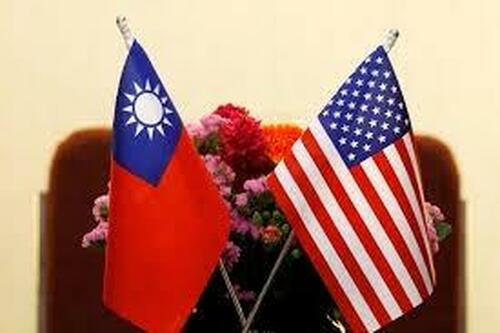



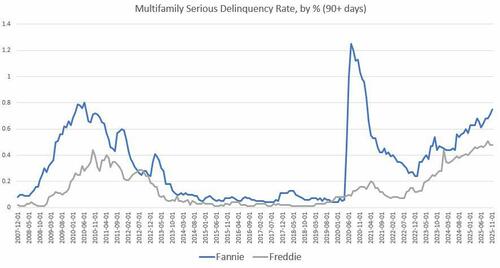
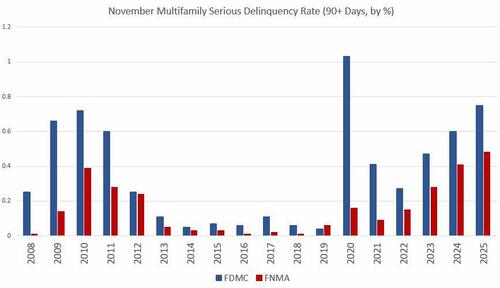




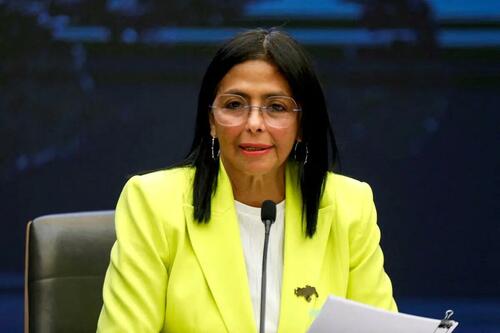

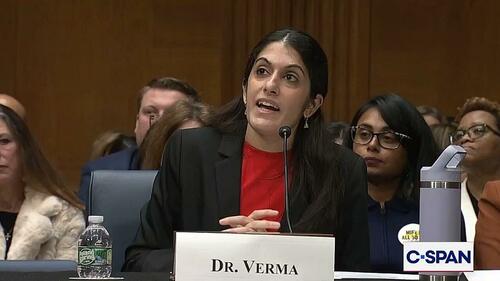
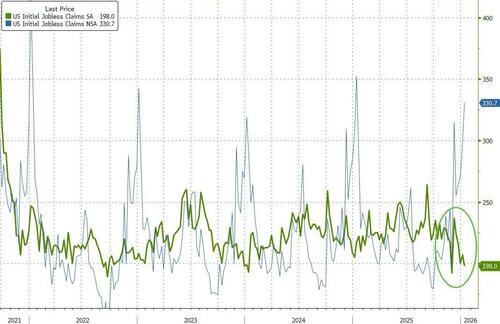
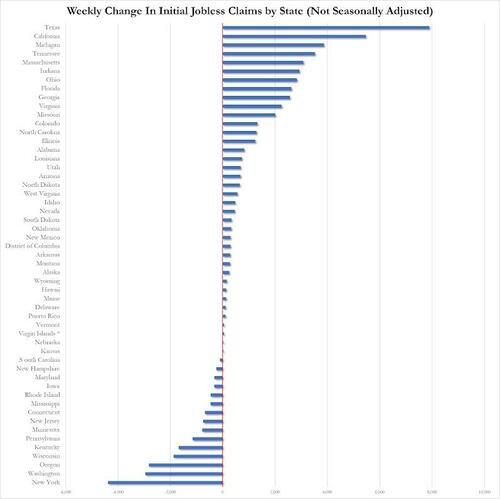
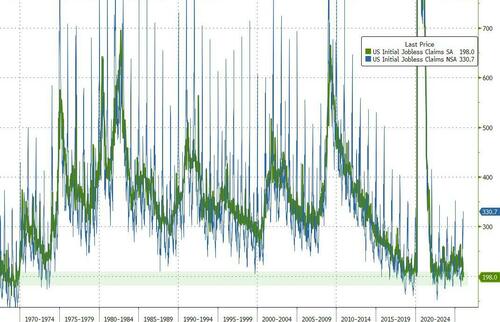
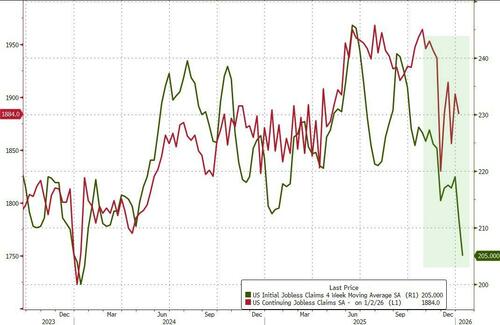



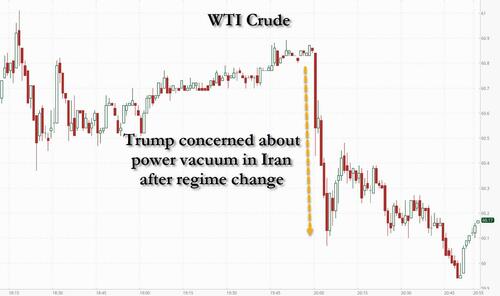
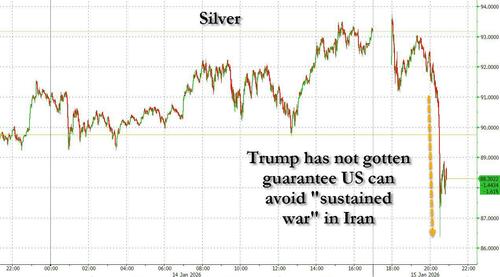
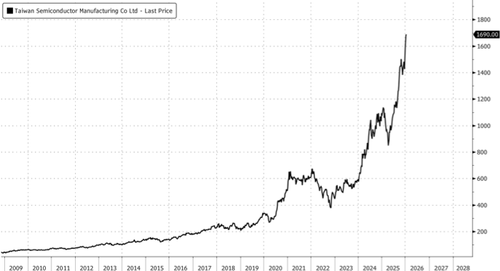
 Displaced Palestinians walk through floodwaters following heavy rains in Gaza City on Dec. 15, 2025. Omar al-Qattaa/AFP via Getty Images
Displaced Palestinians walk through floodwaters following heavy rains in Gaza City on Dec. 15, 2025. Omar al-Qattaa/AFP via Getty Images The Department of Justice in Washington on Feb. 12, 2025. Madalina Vasiliu/The Epoch Times
The Department of Justice in Washington on Feb. 12, 2025. Madalina Vasiliu/The Epoch Times
Recent comments